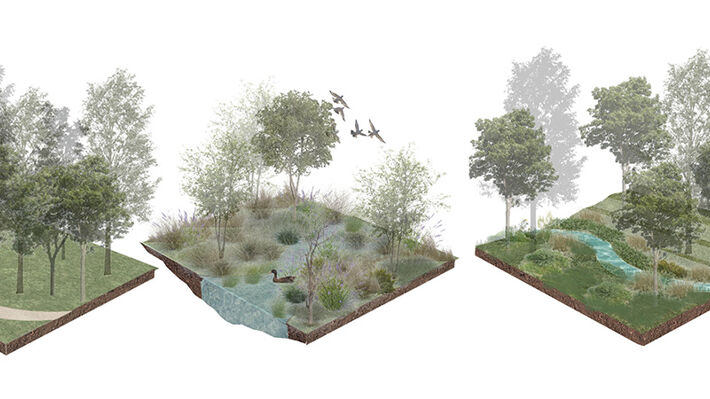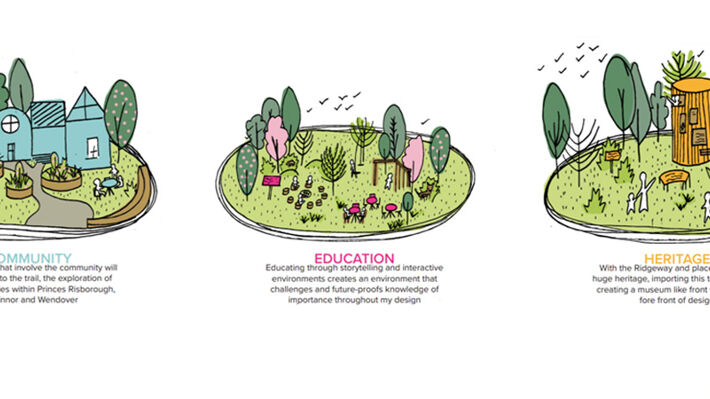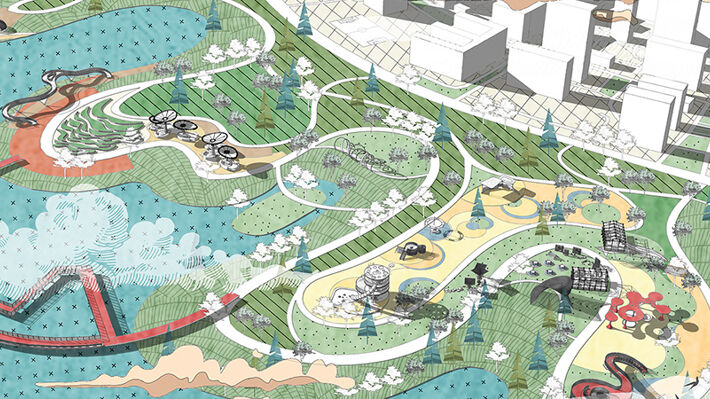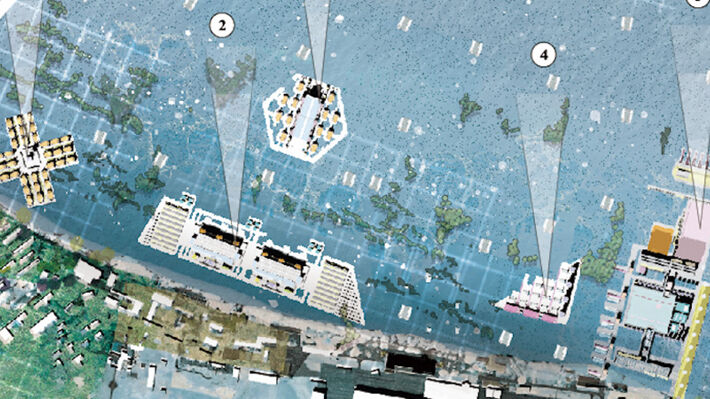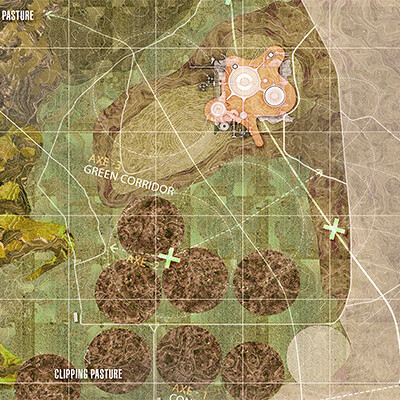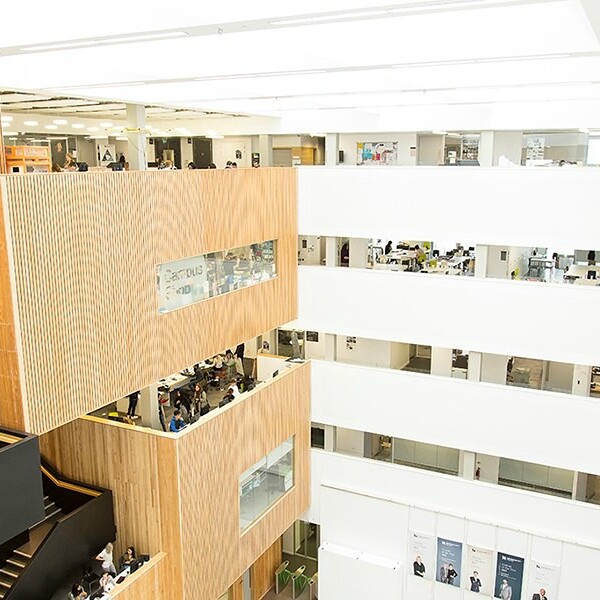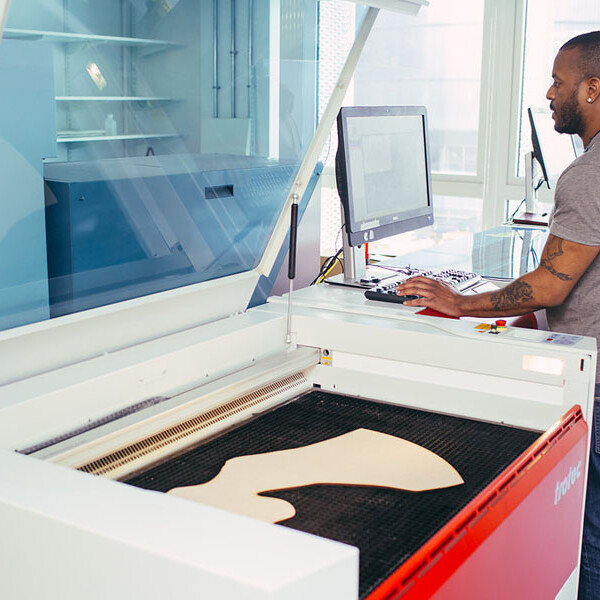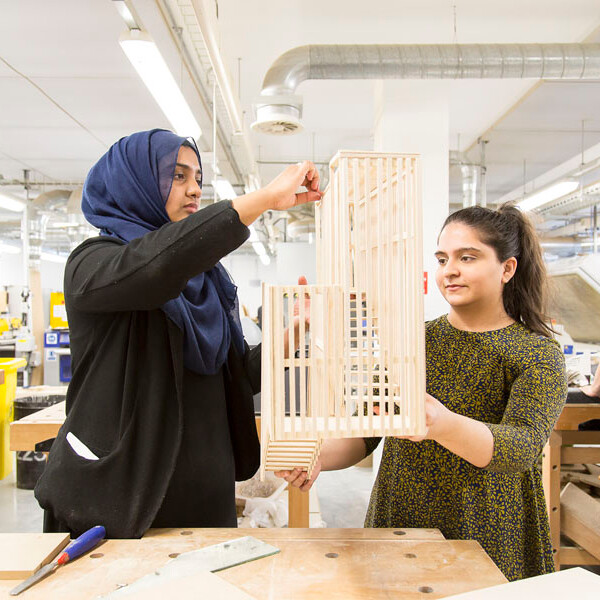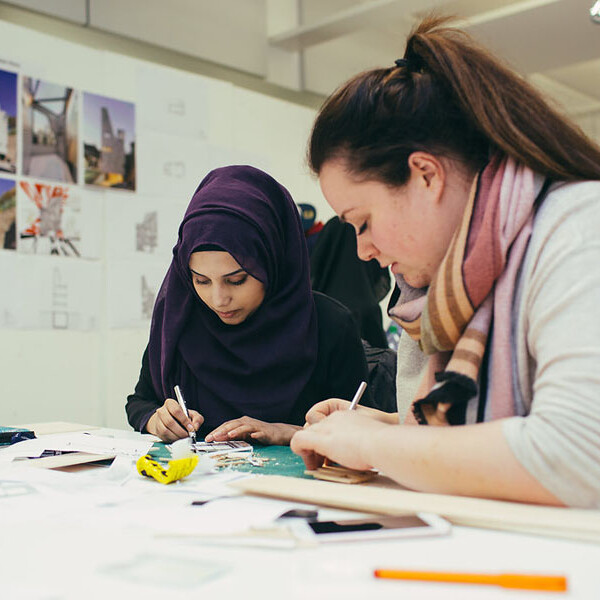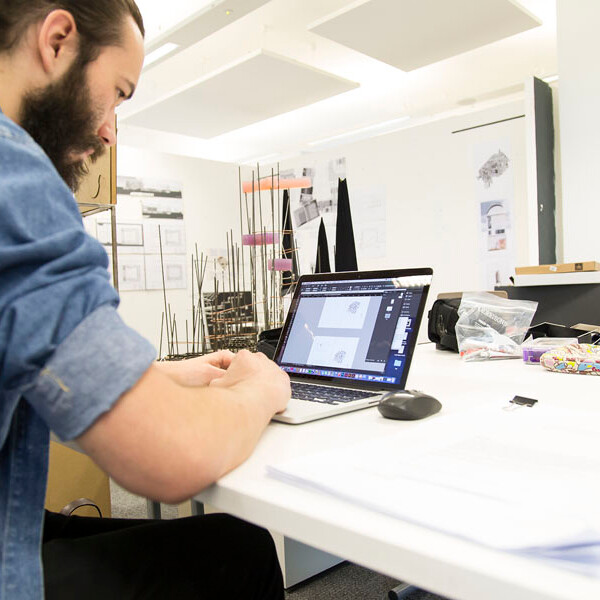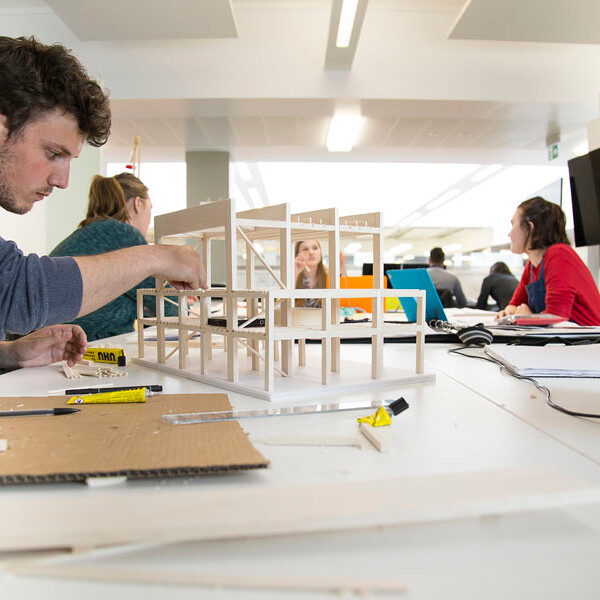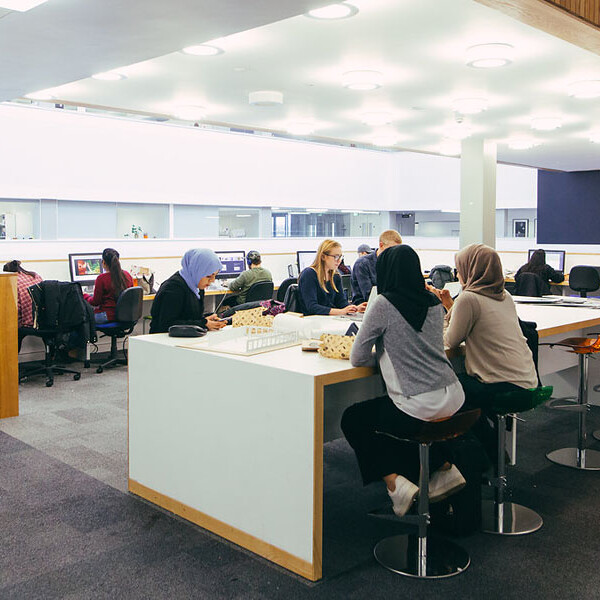Landscape Architecture - BA (Hons)
Currently viewing course to start in 2025/26 Entry.
Studying Landscape Architecture at BCU will equip you with the knowledge required to design and deliver projects when you graduate. We prioritise hands-on learning, allowing you to explore ideas and themes through a variety of design briefs. Landscape Architecture incorporates a range of skills from adjacent disciplines - from ecology, horticulture, policy and governance, to history and urban design. If you have interests in the arts or sciences, there is a place for you here.
- Level Undergraduate
- Study mode Full Time
- Award BA (Hons)
- Start date September 2025
- Fees View course fees
- Subject
- Location City Centre
This course is:
Available with Professional Placement year
Open to International Students
Overview
Do you want to design the spaces around you? Landscape architecture involves crafting outdoor environments that blend art, functionality, and natural systems. You could create parks, playgrounds, green spaces, town squares, or even entire cities! A Landscape Architect's role is to create suitable and inclusive spaces for all users. So, if you have ideas for improving the world around you, Landscape Architecture offers an opportunity to explore them.
As a Landscape Architect, you will respond to real-world problems and challenges, such as improving air quality, food security and water management, offsetting carbon footprints, and reducing energy waste. The outdoor environment also has significant links to well-being and mental health, and you could be at the heart of designing sustainable urban living that will benefit society for years to come.
During your time with us, you will engage with various design and research processes and consider the potential of working with nature and the built environment at multiple scales - from detailing intimate courtyards to regional spatial and ecological strategies.
What's covered in this course?
Covering all aspects of Landscape Architecture, our course is fully recognised and accredited by the Landscape Institute (LI) and supported by a team of leaders in the field.
We embrace a creative studio culture, which mirrors professional working practices and is supported by work placements to prepare you for your future career. We encourage and support our students in competing for industry awards.
During your study, you will be part of collaborative architecture and design initiatives, giving you the opportunity to work on a diverse variety of live projects. Recent examples include urban revival in Brindleyplace, exploring the 15-minute campus concept, and the award-winning grass-roots community engagement in Bangladesh.
We host a programme of lectures and workshops from a large variety of renowned international professionals, from Martha Schwartz to Andrew Grant and Bruno Marques.
The Landscape Architecture course is based in our Parkside Building, overlooking Eastside Park on our multi-million-pound City Centre Campus; providing access to digital studios, 3D design workshops, traditional print, ceramics, metal and woodworking spaces.
Professional Placement Year
This course offers an optional professional placement year. This allows you to spend a whole year with an employer, following successful completion of your second year, and is a great way to find out more about your chosen career. Some students even return to the same employers after completing their studies.
If you choose to pursue a placement year, you will need to find a suitable placement to complement your chosen area of study. You will be able to draw on the University’s extensive network of local, regional, and national employers, and the support of our Careers teams. If you are able to secure a placement, you can request to be transferred to the placement version of the course.
Please note that fees are payable during your placement year, equivalent to 20% of the total full-time course fee for that year.
Accredited By
The course is an excellent combination of freedom and practicality, encouraging bold, creative visions and ideas whilst asking how to implement them in real life environments. The experience, knowledge and support shared by the lecturers provide a great foundation for students to learn and develop the skills needed to gain employment and produce meaningful well designed spaces for the future.
Peter Latham
ELLIE WINNEN
Studying BA Landscape Architecture at BCU has been a transformative experience for Ellie, blending creativity with practical skills and industry connections. From gaining valuable work experience to joining the Dance Society, Ellie has embraced every opportunity to grow both professionally and personally. With supportive tutors, state-of-the-art facilities, and a vibrant city to explore, BCU has provided the perfect environment for her to thrive.
Read in fullWhy Choose Us?
- The course is fully recognised and accredited by the Landscape Institute, allowing you to work towards full UK chartered membership.
- You’ll gain real industry experience, working on a wide range of briefs, from broad strategic scale, down to detailed design for construction.
- Our connections with the region’s best landscape architecture practices give you unrivalled work experience while studying and helps you secure employment after graduation.
- 91 per cent of leavers from the College were in employment or further study, according to a recent survey.
- The College is highly respected and has a rich history of providing education and opportunities. It celebrated its centenary in 2009.
- Two-thirds of the impact of our research was judged to be very considerable (3*) or outstanding (4*) - REF2021
Talk to the Course Director
If you would like to ask any questions about the course, you are welcome to email the Course Director on Sze.Ng@bcu.ac.uk. Alternatively, you can register for our next open day.
Open Days
Join us for an Open Day where you'll be able to learn about this course in detail, chat to students, explore our campus and tour accommodation. Booking isn't open for this event yet, register your interest and we'll let you know as soon as booking goes live.
Next Open Day: 28 June 2025
Entry Requirements
These entry requirements apply for entry in 2025/26.
All required qualifications/grades must have been achieved and evidenced at the earliest opportunity after accepting an offer to help confirm admission and allow for on-time enrolment. This can also include other requirements, like a fee status form and relevant documents. Applicants can track their application and outstanding information requests through their BCU mySRS account.
Essential requirements
- Standard offer: 112 UCAS Tariff points. Learn more about UCAS Tariff points.
- Accelerate offer: 80 UCAS Tariff points. Find out more about BCU Accelerate.
Applicants will also need to submit a good portfolio.
If you have a qualification that is not listed, please contact us.
Don’t meet our entry requirements?
You could apply for a foundation course or a course at our International College. These routes have lower entry requirements and act as the bridge to a full degree. To find out more, please select your status:
Fees & How to Apply
UK students
Annual and modular tuition fees shown are applicable to the first year of study. The University reserves the right to increase fees for subsequent years of study in line with increases in inflation (capped at 5%) or to reflect changes in Government funding policies or changes agreed by Parliament. View fees for continuing students.
Award: BA (Hons)
Starting: Sep 2025
- Mode
- Duration
- Fees
- Full Time
- 3 years
- £9,535 in 2025/26 ✱ Important note for this price
- Apply via UCAS
(↩Back to price) * The Government is proposing to increase the cap on full-time regulated tuition fees to £9,535 for 2025/26 and the University is planning on increasing fees to that maximum level once legislation is enacted. Part-time fees are charged pro-rata, where applicable.
International students
Annual and modular tuition fees shown are applicable to the first year of study. The University reserves the right to increase fees for subsequent years of study in line with increases in inflation (capped at 5%) or to reflect changes in Government funding policies or changes agreed by Parliament. View fees for continuing students.
Award: BA (Hons)
Starting: Sep 2025
- Mode
- Duration
- Fees
- Full Time
- 3 years
- £17,690 in 2025/26
Guidance for UK students
UK students applying for most undergraduate degree courses in the UK will need to apply through UCAS.
The Universities and Colleges Admissions Service (UCAS) is a UK organisation responsible for managing applications to university and college.
Applying through UCAS
- Register with UCAS
- Login to UCAS and complete your details
- Select your course and write a personal statement
- Get a reference
- Pay your application fee and submit your application
Guidance for International students
There are three ways to apply:
1) Direct to the University
You will need to complete our International Application Form and Equal Opportunities Form, and submit them together with scan copies of your original academic transcripts and certificates.
2) Through a country representative
Our in-country representatives can help you make your application and apply for a visa. They can also offer advice on travel, living in the UK and studying abroad.
3) Through UCAS
If you are applying for an undergraduate degree or a Higher National Diploma (HND), you can apply through the UK’s Universities and Colleges Admissions Service (UCAS).
You can request a printed form from your school or nearest British Council office. You will be charged for applying through UCAS. Birmingham City University’s UCAS code is B25 BCITY.
Portfolio guidance
If you receive an offer to study this course, you will be required to submit a portfolio. We ask that this is submitted within four weeks of receiving your offer.
Please see our portfolio guidance page for tips on putting your portfolio together.
Portfolio guidance
If you receive an offer to study this course, you will be required to submit a portfolio. We ask that this is submitted within four weeks of receiving your offer.
Please see our portfolio guidance page for tips on putting your portfolio together.
Personal statement
UK / EU students are required to submit a personal statement as part of their application for this course.*
The personal statement gives you a crucial opportunity to say why you’re applying and why the institution should accept you.
Here are the key areas you’ll need to address:
- Course choice - Why does this course appeal? What areas are of particular interest?
- Career plans - If you have a specific career in mind, say how your chosen course will help you pursue this goal.
- Work experience - Mention any work that is relevant to your subject, highlighting the skills and experience gained.
- School or college experience - Highlight skills gained at school/college, eg summer schools or mentoring activities.
- Non-accredited skills or achievement - eg Duke of Edinburgh Award, Young Enterprise scheme.
You should also mention your future plans – if you’re planning to take a year out, don't forget to give your reasons. Talk about any subjects you’re studying that don’t have a formal assessment and any sponsorships or placements you’ve applied for. And don't be scared to add in details about your social, sports or leisure interests.
Worried about Personal Statements?
If you've got no idea where to start or just want to check you're on the right track, we’ve got expert advice and real examples from our students to help you nail your personal statement. You can even download our ultimate personal statement guide for free.
*Non-EU students are not required to submit a personal statement when applying for this course.

Financial Support
We offer further information on possible undergraduate financial support. This includes the type of loans, grants and scholarships available both from the government and from Birmingham City University.
Course in Depth
Year one
Laying the foundation for deeper understanding, this year covers a broad spread of study areas, moving seamlessly, connecting abstract design theory and consideration of global scale contexts, to micro-scale understanding of materials and technology.
Through this process, you will gain an understanding of the scope, scale and connectivity of landscape architecture, its transformative abilities and power to help ensure a global human future.
In order to complete this course you must successfully complete all the following CORE modules (totalling 120 credits)
Modules include:
Looking at the sources of inspiration within the international subject of Landscape Architecture, the module provides a broad introduction for you to begin to engage with the dynamics of a structured design process. Focus on each of the core principles will allow you to develop overall structural understanding of the subject, as well as the fundamental academic and design skill sets that will be required through the course and your future career, be that in Landscape Architecture, or a related field.
Developing a core transferable graphical skill set for Landscape Architecture and aligned, wider designed-environment industries. The module introduces industry standard methods and building on these to promote exploration of innovation and self-derived techniques in representing architectural space and site characteristics. Approaches introduced, will consider the benefits of physical and digital production methods, two dimensional and three dimensional representation, and frameworks for self-guided, work allocation, and time management in production.
Exploring the contextual framework within which the contemporary Landscape Architect practices: students will research and explore the scale, scope, and timeline of human impact on the Earth’s landscape and the impact of environmental factors on human development and systems.
Setting out a fundamental understanding of the broad design palette available to the Landscape Architect, including the key considerations for specifying and sourcing materials, systems and ecologies. Focus will be on curating the design fabric, aiming to emphasise character and function: through explorations in visual composition, colour, texture and form; to uncover deeper understandings on the emotive effects, cultural-historical references of association and the fundamental practical requirements and benefits of various design applications.
Moving up through scale, from the human perspective of 1:1, up to the common Landscape Architecture scales of 1:1000/1:1250, you will look at composition of increasingly large landscape components. As the scale range widens you observe the increasing considerations coming into play: physical and psychological interactions between the human and physical environment; a study of mass and void, of textural, sound, smell and colour qualities.
Year two
You'll develop professional approaches to design and construction in your second year.
You will develop connections between key design theories and real-world practice, through debate of current topics, placement study, collaborative projects (Co.LAB), and the exploration of two different multifaceted design processes.
Modules include:
In order to complete this course you must successfully complete all the following CORE modules (totalling 100 credits):
Building on an understanding of materiality and planting design, particularly from the previous year one modules, Inspiration, Components and Formation, this module develops your understanding of fully constructible, detail design and material specification, integrated with planting design, layout and specification. The outputs will be research led and focus on deepening and refining your understanding of how structure, technologies and living systems are integrated within real-world applications.
This module has a focus on developing a refined and deeper understanding of key socio-cultural/historical and artistic influences on contemporary Landscape Architecture theory and practice. You will look at major themes and their key proponents through specialised study areas and group debate. You will be encouraged to develop critical thinking in the review of a variety of theoretical positions, cultural beliefs and physical processes and historical context. The aim is to explore and debate on the common preconceptions and design practices of contemporary practice whilst developing an understanding of multiple approaches to research.
The purpose of this module is to enable you to develop professional attributes and subject skills through experience in the work place or a live case study, and to critically reflect upon your learning and future options in that context. You will normally be expected to arrange your own placement, with support from academic staff and BCU Careers. Typically, the placement duration is 1 or 2 weeks. This should be achieved in one block where possible. It is also possible to fulfil this module through a case study, via physical interview of a current practise if placement becomes unattainable.
The outcomes of this module will be supported with a lecture series and tutorial input in enabling an understanding of your industry in context, business operations, and industry expectations. In order to secure your placement you will undertake a pre-placement interview to understand your personal preferences, followed by collation of CV and on-line / off-line portfolio presence to substantiate your application.
The Urban Design module consists of a design project for redevelopment of a pivotal civic space network, with a focus on making dynamic, lively, places for people. You will develop proposals for a layered vision to reinvigorate and enliven a ‘sense of place’ across a broad area. This will be supported with a strategy for the area and a masterplan design/redesign of one key area, with multiple designed interventions for improving local identity and use of the place.
Designed Ecologies is an exploration of multi-layered systems, incorporating and integrating social and ecological components within the design of space. You will undertake a design project working from a strategic level of analysis and networking of habitats and green spaces to detail design for enhancing specific ecology and visitor experience whilst considering an overall sustainable environmental design approach.
In order to complete this course a student must successfully complete at least 20 credits from the following list of OPTIONAL modules.
The module is an opportunity to learn and critically reflect on the skills of collaboration by enabling you to create an interdisciplinary project with students from complementary disciplines, or with academic staff.
Collaboration is a vital employability skill within the Creative Industries and this module allows you to develop these skills, making use of University facilities and with the support of academic staff. Within this module framework, several kinds of collaborative opportunities are available. For example, with the approval of your supervisor, you can determine a project based on your own interests; your supervisor may set you a predetermined project to enable you to work with other students in a way that is appropriate to your subject area; or there may be opportunities for you to collaborate with staff on research projects. In all cases, you must apply your subject skills to an interdisciplinary project which will be agreed in advance with your supervisor.
This module provides an opportunity for you to apply your knowledge and skills to an external, professional brief. The brief will be set by an external client/ agency, in consultation with your supervisor, and it could be a ‘real life’ problem to be solved, or a simulation. It is an opportunity for you to engage in a professional manner with an aspect of your subject area, which contributes to the development of employability skills within the supportive infrastructure of the University. Where appropriate, the project may involve interdisciplinary collaboration with students from other courses. In this way, it reflects the collaborative, flexible nature of employment within the Creative Industries.
Core modules are guaranteed to run. Optional modules will vary from year to year and the published list is indicative only.
Professional placement year
In order to qualify for the awards with Professional Placement, a student must successfully complete all of the modules listed above as well as the following Level 5 module.
This module is designed to provide you with the opportunity to undertake a credit bearing, 40- week Professional Placement as an integral part of your Undergraduate Degree. The purpose of the Professional Placement is to improve your employability skills which will, through the placement experience, allow you to evidence your professional skills, attitudes and behaviours at the point of entry to the postgraduate job market. Furthermore, by completing the Professional Placement, you will be able to develop and enhance your understanding of the professional work environment, relevant to your chosen field of study, and reflect critically on your own professional skills development within the workplace.
Final year
Through guided but self-directed investigations, you will define your own academic pathway.
Built on research and led via creative but pragmatic exploration in design, you will successfully communicate connections between theory, contextual analysis, project brief, conceptual proposals, design development and design detail, to produce a broad-scale, multi-layered design project.
Modules include:
|
Through guided but self-directed investigations, you will define your own academic pathway. Built on research and led via creative but pragmatic exploration in design, you will successfully communicate connections between theory, contextual analysis, project brief, conceptual proposals, design development and design detail, to produce a broad-scale, multi-layered design project. In order to complete this course a student must successfully complete all the following CORE modules (totalling 120 credits) |
The purpose of the module is to enable you to undertake a sustained, in-depth and theoretically informed research project exploring an area that is of personal interest to you. It is important that we can support you appropriately, so you will be guided towards choosing a research topic which is relevant to your discipline and in which your lecturers have expertise. The outcome may take the form of a written dissertation or a practice-based portfolio.
Building from the Praxis approach utilised within the College, this module completes the conceptual thread of modules which connect a Professional practice suite through from Skills and Praxis, developing and integrating industry aligned skills and approaches, preparing you for entry into competitive professional contexts after study. A fundamental aspect of the module is to increase your self-reliance and confidence in communicative approaches and contextual understanding of their application.
You will start by defining a project site at strategic scale, which aligns to a sophisticated set of aims and identified contextual and/or theoretical issues (such as that explored in the Major Project module) and design potentials. Critical analysis will be required to consider and decide on a suitable site for study. Further to this you will be expected to explore site conditions and design ideas to create an integrated conceptual design brief and vision the specific chosen site.
The ‘concept design’ will set out the key design principles of the project proposals, use, character and experiences, with the aim of selling the design to the client, stakeholders and public audience. Final outputs will form the basis for a Masterplan design in Major Design: Deliver.
Through the production of a masterplan, students will refine a set of complex physical and cultural site specific issues, to define creative and sophisticated solutions. This will demonstrate the broad range of technical and communicative skills, as well as a breadth and depth of understanding in creative design, process and context, aspects which make up the core areas of Landscape Architecture.
Finally, through research, exploration and guidance, students will produce accurate detailed, construction design and planting design proposals, which communicate a comprehensive hard and soft materials specification, using appropriate techniques in representation.
Download course specification
Download nowOur landscape architecture degree is assessed on 100 per cent course work, with no practical or written exams. We feel this best mirrors the way you’d work in the real world and so better prepares you for a career in the landscape design industry.
You'll benefit from our extensive resource base, including digital studios and 3D design workshops. There will also be traditional drawing workshops with observational and technical drawing, model-making and digital visual communication skills. You'll begin to develop a strong portfolio and confidence with design principles and all aspects of communication.
The course follows a clear development path over its duration.
- Year One – foundation principles of landscape architecture
- Year Two – Realism, collaboration, design sectors, practice and construction
- Year Three - Bespoke study integrating theory, practice and professionalism
Classroom Activities
- Design studio – working on design projects with tutor and peer discussion and guidance
- Study trips – see exemplary and interesting projects and sites with great opportunity
- Workshops and skills training of key software and approaches to visualisation
- Industry-aligned course, supported by collaborations with external partners and real projects, with potential opportunity for a work placement.
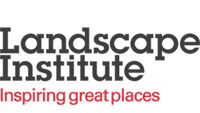
Landscape Institute
Our course is accredited by the Landscape Institute. LI accreditation requires education providers to meet important criteria which ensure high standards are maintained, meaning you can be sure your course meets the standards needed for you to enter the landscape profession.

IFLA
Employability
Enhancing your employability skills
You’ll have a sound knowledge of the physical, economic and social factors which influence contemporary built environment practice. You’ll also understand the professional, legal and institutional framework of landscape architecture.
You’ll develop a comprehensive portfolio that shows employers a range of skills in design practice and academic study.
Experience on live local sites with client-driven briefs in landscape studios will develop your design creativity and hone your professional practice skills.
You’ll be skilled in the latest techniques, including rapid prototyping and 3D design.
The course supports student employability and long-term career opportunity through enhancing your development and instilling an understanding of life-long professional progression.
You’ll develop a range of transferable skills, such as how to communicate ideas and solve problems, as well as developing negotiation and planning skills. You’ll learn how to work effectively and efficiently either on your own or as part of a team.
Placements
During her studies on the BA (Hons) Landscape Architecture course, Daniela Teleku completed a work placement at Fira, a nationally recognised practice of landscape architects, urban designers, master planners and architects.

Daniela wanted experience working for a practice where Architects worked together with Landscape Architects and Fira stood out as a firm with a multidisciplinary approach to projects.
Daniela was given the opportunity to get involved in a range of project work all at different stages, from early design to on site. Her work included detailed design for construction, conceptual and innovative design for a new play area in a historic park, looking at materials for construction, and a site visit at University of Birmingham Hotel and Conference Centre. She also built a 3D Revit model for a mental health project.
A thoroughly enriching experience that has substantially expanded my knowledge of, and curiosity in landscape architecture. With projects across a diverse range of sites and scales, that encourage students to create innovative proposals to tackle the multitude of problems facing rural and urban landscapes across the globe in the 21st Century
Joshua Hallett, BA (Hons) Landscape Architecture Student
The course encouraged me to express my unique creativity whilst also teaching me a wide variety of practical skills in order to prepare for industry, which the course has strong links to. During my second year, I started part time work at an architecture practice which I was introduced to through my course tutor and since graduating have started working there full time.
Mary Deguara, BA (Hons) Landscape Architecture Graduate
Facilities & Staff

Our Facilities
When you join Birmingham City University, the first thing you will notice is the exceptional quality of our campuses. With an investment of over £400 million across our buildings and facilities, we are committed to giving you the very best learning environment to help shape your experience.
You will be based in our multi-million pound Parkside building – a state of the art facility located within our City Centre Campus. Here you will have full access to our recently upgraded, high spec CAD (Computer-Aided-Design) workstations situated within our dedicated computer labs and open access areas. We also provide access to leading edge digital design software, enabling you to explore technical drawing, graphics, 3D modelling, visualization, animation, computation, simulation, and virtual reality.
The Parkside Building is also home to our digital fabrication labs, where you will be able to explore 3D printing, laser cutting, CNC machining, ceramics, glass and traditional model-making, guided by our team of expert technicians with access to our on-site material store, and professional printing facilities.
You’ll also benefit from:
- Design studios
- Physical and digital library
- Loanable laptops
- Dedicated social spaces
- Cafés
Photo Gallery
From industry-standard software, to our workshops and studio spaces, everything you need will be at your fingertips from day one. Working with our dedicated teaching teams and expert technicians, you'll be supported from concept through to completion.
Our staff
Eccles Ng
Course Director for BA Landscape Architecture and BA Landscape Architecture with Urban Design
With a diverse background in architecture, landscape architecture, urban design, and art, Eccles promotes a holistic, adaptable, and value-driven approach to education. He is dedicated to creating a dynamic and inclusive learning environment that equips students with the skills and confidence needed for both academic excellence and professional...
More about EcclesEmma Widdop
Lecturer in Landscape and Sustainable Urbanism
Built upon a foundation of art practice and educated in architecture, landscape, urban design and horticulture, Emma’s work crosses disciplinary boundaries to place the human experience at the centre of design rationale.
More about EmmaLucas Hughes
Course Director for MA Urban Design
Lucas Hughes holds qualifications in landscape architecture and urban design. He has a broad range of interest and experience within several professional sectors linking across the built-environment industry. His core focus is to promote high quality, integrated, design-led processes for the creation of characterful and sensitive built environment...
More about LucasDr Sandra Costa
Academic lead for Landscape Architecture & Course Director MA Landscape Architecture
Sandra is a lecturer and researcher in landscape architecture and design with diversified experience encompassing teaching, research and professional practice. She has lectured in the UK and Portugal in undergraduate and postgraduate courses. Her teaching explores current issues and challenges faced by landscapes and the built environment, to...
More about SandraDr. Alex Albans
Research Fellow in Landscape Architecture
Dr Alex Albans is a Research Fellow at the West Midlands National Park Lab, investigating landscape as a manifestation of the culturally-framed relationships between people and their territories. Alex’s research-informed teaching at BCU focuses on how designers ‘get to know’ the places they’re working with, and how this impacts their design...
More about Alex